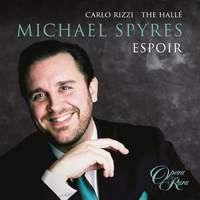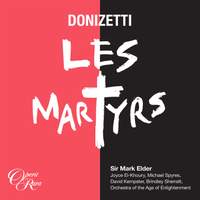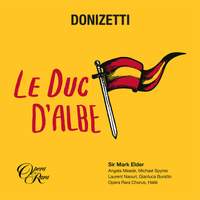Interview,
Michael Spyres on Espoir
 The maverick American tenor Michael Spyres is everywhere this autumn - he appears on John Eliot Gardiner's imminent recording of Mendelssohn's Lobgesang with the London Symphony Orchestra, and sings the hugely demanding role of Énée on John Nelson's long-awaited recording of Berlioz's Les Troyens (due out on Erato on 24th November - I've just listened to a preview copy of Part One, and his performance is electrifying).
The maverick American tenor Michael Spyres is everywhere this autumn - he appears on John Eliot Gardiner's imminent recording of Mendelssohn's Lobgesang with the London Symphony Orchestra, and sings the hugely demanding role of Énée on John Nelson's long-awaited recording of Berlioz's Les Troyens (due out on Erato on 24th November - I've just listened to a preview copy of Part One, and his performance is electrifying).
But first and foremost is his debut solo disc of opera arias, Espoir (released this Friday on Opera Rara in tandem with Joyce El-Khoury's Écho, which we featured last week and on which Michael also appears), exploring the short but extraordinary career of the Parisian tenor Gilbert Duprez (1806-96). Commonly credited as the first tenor to sing high Cs in full resonance, Duprez revolutionised the way that composers including Donizetti, Halévy and Berlioz wrote for the voice and originated roles including Benvenuto Cellini, Edgardo in Lucia di Lammermoor and Polyeucte in Les Martyrs (which Spyres recorded for Opera Rara to great acclaim in 2015).
I met up with Michael on the afternoon of his final performance in the title-role of Mitridate at the Royal Opera House in July, where he talked to me at length about Duprez's critical role in the evolution of the tenor voice as we know it today and the remarkable music which his vocal pioneering inspired.
How and when did you hit on the idea of a tribute to Gilbert Duprez, and what made him such an influential figure in the history of singing?
Because of the way that Opera Rara has developed in the last two years, we have that little bit more freedom. After the success of Les Martyrs and Le Duc d’Albe, they suggested that Duprez would fit me really well, and when I started looking into him I thought ‘Wow, he really was one of maybe five tenors in history that just changed everything’. He started his career as a light lyric, but after studying in Italy he learned a different way of production and acquired a larger sound – he’d discovered how to change the vocal formants to just power through the orchestra, so people started writing for him to capitalise on that.
It’s not that no-one had done this kind of thing at all as a one-off in the past: Manuel Garcia (who came 20 years before Duprez) and some of his colleagues were already singing high Cs in full chest, but the repertoire they sang wasn’t actually written that way. Duprez's great innovation was that he'd developed a technique to actually sustain this crazy tessitura: Donizetti and the composers immediately afterwards realised they could change the way they wrote for the voice entirely. And those early performances must’ve been pretty scary for Duprez, because the whole world was against him: that entire generation of opera-goers were used to hearing things sung a certain way, and he came along and completely confounded the audience's expectations. It’s almost the opposite now: if you were to sing ‘Di quella pira’ with a voix mixte on the high C these days, people would boo and think it was the worst thing in the world!
Duprez was in great demand for a couple of years, but it wore on him: when was my age he was already showing signs of vocal atrophy. He sang in the premiere of Benvenuto Cellini when he was 38, and Berlioz was very unhappy: he said words to the effect of ‘He sounds like he’s going to lose his voice the whole time’, and Duprez quit shortly afterwards. He was 42, so it was a pretty short career, but the thing with being a pioneer is that if no-one’s come before you then no-one knows what to do when things get difficult…
Even in the context of the kind of repertoire you normally sing, the range on display here is staggering – the first aria alone goes from a low A to high D…
Exactly. But the interesting thing is that up until Duprez, everyone was expected to sing two-and-a-half octaves. Male and female voices were all in that zwischenfach [in-between] zone that didn’t continue much longer - because orchestration got heavier, and because the tessitura kept being pushed higher and higher to generate excitement. (Wagner was actually one of the composers who brought it back down – much of his music sits literally a tone lower than most of the other vocal writing of the time).
What’s so interesting about Duprez is not just his range but his versatility. Take the Auber aria on this disc: that’s so light and effervescent that it sounds like it was written for a leggiero tenor, then you go to the Halévy and it’s super-dramatic. If Duprez's known at all these days, he’s known as being ‘The High C Guy’, but I think if that’s all he’d been then people would’ve tired very quickly! When I started looking into him as a person, I realised that he was constantly in the public eye in different capacities: after he retired from performing, he wrote a book about singing and became a professor, and he was one of the most well-loved mayors for decades in a small town in France.
Was absolutely everything on here actually written for Duprez, or did you also include any of his signature-roles which were written for other singers?
We decided just to focus on what was specifically written for him, though he certainly had other signature-roles, like Arnaud in Guillaume Tell, which was actually written for Adolphe Nourrit. I wanted to include the Rossini Otello because I’m known as a baritenor - but then I discovered that Duprez gave the first performances of the role in French! That was really an opportunity not to miss, because literally no-one’s ever heard that French version in modern times - there’s never been a recording. To be honest, there‘s nothing really tailored for Duprez in the new version (certain recitatives and things were re-written), but he was the one who premiered it!
At the other extreme, there’s Halévy’s Guido et Ginevra, which is there thanks to Roger Parker [Opera Rara’s resident musicologist]. I’d heard of it, but looking at the music and singing it was just incredible. When I first opened the score I thought: ‘Hold on – Wagner and all these people who came afterwards, they were just flat-out stealing from Halévy!’
So Duprez clearly had a seismic impact on composers - but do we know how audiences responded?
With huge enthusiasm! He became a massive sensation, and that’s why Adolphe Nourrit, who was the leading tenor at the Paris Opera, was dethroned. It wasn’t that Nourrit couldn’t nail high Cs every once in a while, but he didn’t have a technique that could deal with that kind of repertoire with that kind of brilliance – and that’s ultimately why he backed off. Now Nourrit was a true artist and an amazing person: he wrote ballets, he wrote libretti; he was the first person to bring Schubert lieder to Paris. But he also had serious mental health problems: he was maybe what we’d now call bipolar, and battled with alcoholism throughout his life. He knew that Duprez had learned this new technique in Italy, so a year or so after Duprez took Paris by storm Nourrit decided to do the same and went to Naples where he and Donizetti collaborated on what would later became Les martyrs - but Nourrit was terribly isolated and depressed, drinking heavily by himself to self-medicate, and eventually he committed suicide. He was just 39.
Poor Duprez felt absolutely terrible, because despite the amicable rivalry the two men were true friends - but people accused him of adding to the pressure Nourrit was under, and he even states in one of the books he wrote late in life that he still felt terribly sad that Nourrit couldn’t deal with the demons within him.
How much of the ornamentation is yours?
Every single thing on this disc is as written – other than one high E flat in the Auber aria, and the high D in Otello that I put in just for fun! (It’s the first track on the disc and I thought ‘Hit them with it all!’). Speaking of high notes, I must mention the Act One duet from Lucia di Lammermoor, which appears on Joyce’s album and is just phenomenal. Donizetti and Duprez were the dearest of friends (he wrote six operas that brought Duprez great success), and in the actual manuscript he writes a high E flat for Edgardo in that duet, so that's what I did on the recording! Now that kind of thing really confirms that Duprez wasn’t a heldentenor – you couldn’t physically get up to a high E flat with a voice and technique like that. And it makes sense – Lucia has so much to sing later on that that’s her moment to ‘only’ sing a high C!
Michael Spyres (tenor), The Hallé, Carlo Rizzi
Available Formats: CD, MP3, FLAC, Hi-Res FLAC
Recent and forthcoming recordings featuring Michael Spyres
Michael joins Joyce for Lucia and Edgardo's great Act One duet from Lucia di Lammermoor - complete with the original high E flat!
Available Formats: CD, MP3, FLAC, Hi-Res FLAC
Mendelssohn: Symphony No. 2 'Lobgesang'
Lucy Crowe (soprano), Jurgita Adamonyté (mezzo), Michael Spyres (tenor); London Symphony Orchestra, Monteverdi Choir, Sir John Eliot Gardiner
'Spyres injected a suitably Heldentenor yearning gravitas into the Watchman's Song.' (Classical Source)
Available Formats: SACD + Blu-ray Audio, MP3, FLAC, Hi-Res FLAC
Berlioz: Les Troyens
Joyce DiDonato (Didon), Michael Spyres (Énée), Marie-Nicole Lemieux (Cassandre), Stéphane Degout (Chorèbe); Orchestre philharmonique de Strasbourg, John Nelson
Les Troyens is released on Erato on 24th November.
Available Formats: MP3, FLAC, Hi-Res FLAC
Donizetti: Les Martyrs
Michael Spyres (Polyeucte), Joyce El-Khoury (Pauline), David Kempster (Sévère); Orchestra of the Age of Enlightenment, Sir Mark Elder
'The outstanding contribution comes from Michael Spyres, singing with virtuosic bravado as the heroic convert.' (The Telegraph)
Available Formats: MP3, FLAC, Hi-Res FLAC
Donizetti: Le Duce d'Albe
Angela Meade (Hélène d’Egmont), Michael Spyres (Henri de Bruges), Laurent Naouri (Le Duc d'Albe)
'[Spyres] produces a peerless combination of eloquent French utterance. fearless musicianship and unfailingly beautiful tone.' (Opera Magazine)
Available Formats: 2 CDs, MP3, FLAC, Hi-Res FLAC








